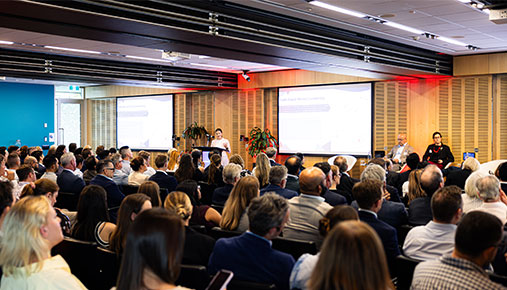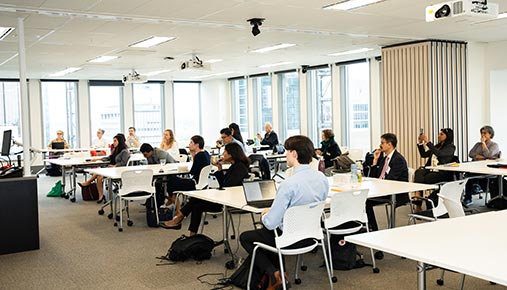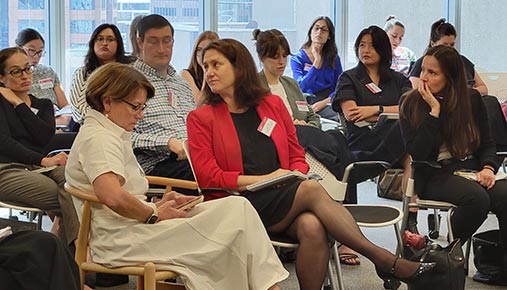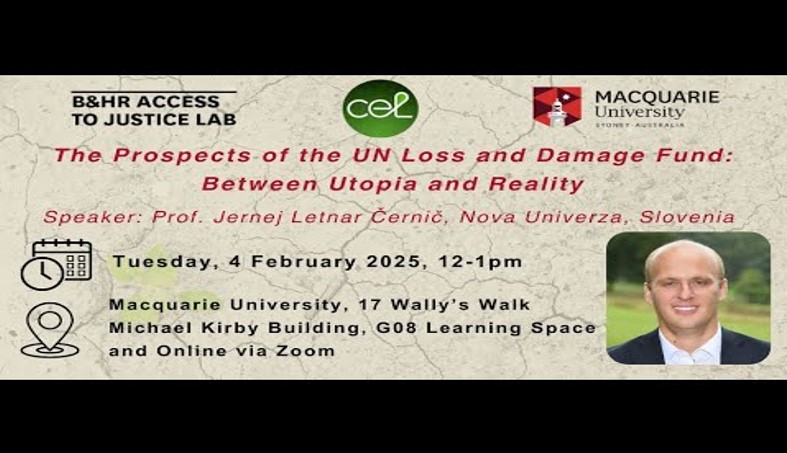Activities and events
Learn more about our activities and events
In addition to conducting impactful research, the A2J Lab team offers pro bono assistance to rightsholders affected by corporate activities, builds capacity of various stakeholders across Asia Pacific, and organises and participates in national, regional and international events.
Pro bono assistance
A2J Lab provides pro bono assistance to the affected individuals and communities in selected cases in securing access to justice through non-judicial mechanisms such as complaints to National Contact Points or the UN Special Procedures.
We primarily focus on alleged abuses in Asia Pacific or linked to companies based in Australia and Asia Pacific. In collaboration with partner organisations, the A2J Lab is currently working on cases in several countries.
Capacity building
A2J Lab builds capacity of various stakeholders such as government officials, corporate executives, civil society organisations, trade unions, lawyers and law students about international standards concerning business and human rights. One of our primary focus areas is raising awareness about access to justice mechanisms, tools and strategies.
The A2J Lab’s Director, Professor Surya Deva, is frequently invited to give lectures or offer intensive training courses across Asia Pacific. He has been teaching business and human rights courses in Bangladesh, Cambodia, Fiji, Hong Kong, India and Thailand.
Upcoming events
-
Seminar with Robert McCorquodale, Member, UN BHR WG
Aug 21, 2025 4:30 pm
Our seminar on ‘The responsibilities of financial institutions: From human rights to climate and conflicts’, will be led by Professor -

Regional forum in Melbourne
Aug 26, 2025
The inaugural ‘United Nations Business and Human Rights Regional Forum: Australia and New Zealand’ will focus on strengthening respon -

Research workshop in Melbourne
Aug 26, 2025 11:00 am
The inaugural ‘Australia-New Zealand Business and Human Rights (BHR) Research Workshop’ will take place as part of the upcoming UN BH
Past events
2025
The future of business and human rights under the Trump Administration
On 13 March 2025, the A2J Lab held a webinar on ‘The future of business and human rights under the Trump Administration’. The webinar was moderated by Professor Surya Deva, the A2J Lab's Director, featuring panellists:
- Joanne Bauer, Co-Founder of Rights CoLab
- Marti Flacks, BHR practitioner and former United States Government official.
This moderated conversation addressed the following topical questions:
- How are the business and human rights initiatives in the United States (US) likely to change under the new US Administration?
- Will the Trump Administration's stance towards business and human rights have impacts on legal and policy initiatives beyond US borders?
- Are US businesses and investors able to speak out for human rights, diversity, equity and inclusion, and climate change?
Advancing human rights, sustainability in Asia Pacific supply chains
On 19 February 2025, Macquarie University’s A2J Lab and Centre for Environmental Law, together with the World Benchmarking Alliance, co-organised a multi-stakeholder roundtable on ‘Australia’s role in advancing human rights and sustainability in Asia Pacific supply chains’.
Business leaders, investors, academics, civil society representatives, and human rights and policy experts gathered at our City Campus for a day of insightful discussions. Lynn Bell, Australian Ambassador to Counter Modern Slavery, People Smuggling and Human Trafficking, set the tone with a powerful keynote address.
In addition to the expert panel discussions and multi-stakeholder dialogue, the roundtable featured the launch of an A2J Lab’s report, which assessed the commitments of 25 of Australia’s largest companies to respect human rights. To learn more about the report findings, read our article in The Conversation.
Participants explored collaborative opportunities to advance corporate accountability, tackle challenges like modern slavery, and contribute to achieving the Sustainable Development Goals in the Asia Pacific. The aim was to foster stronger partnerships and collective actions that support a just and equitable future for all.
The prospects of the UN Loss and Damage Fund
On 4 February 2025, Macquarie University’s A2J Lab and Centre for Environmental Law held a seminar on ‘The prospects of the UN Loss and Damage Fund: Between utopia and reality’. The hybrid seminar was delivered by Professor Jernej Letnar Černič (Professor of Human Rights Law at the Faculty of Government and European Studies, Nova Univerza, Slovenia).
The UN Loss and Damage Fund serves as a financial mechanism to compensate countries adversely impacted by climate change, for related losses and damages that cannot be remedied through mitigation and adaptation measures. The Fund also aims to create non-financial incentives and capacity to rebuild countries and help vulnerable communities.
The seminar addressed the following questions:
- Who are the rights-holders and duty-holders of the Fund?
- What are the Fund’s normative underpinnings, legal scope and nature?
- Is the Fund’s aim also preventive or mostly to compensate the most affected States for losses and damages?
- For the Fund to have credibility and legitimacy, would it have to ensure equality in assisting all countries affected by the negative impacts of climate change?
- What should be the overarching governing principles of the Fund?
2024
The Mariana Dam disaster: A conversation with claimants, their lawyer
On 10 October 2024, Macquarie University’s A2J Lab and Centre for Environmental Law hosted representatives of Indigenous Brazilian groups impacted by the Mariana Dam disaster and their lawyers from Pogust Goodhead, before their English High Court case against Australian mining giant BHP commenced.
At this event, Chief Maycon Krenak, leader of the Krenak people, and Thatiele Monic, leader of the Quilombola communities, shared their stories about the destruction of the Rio Doce. We heard first-hand how their lives and traditions have been severely impacted, and the threats they continue to face from mining activities nearly a decade later. Thomas Goodhead, Global Managing Partner & CEO, and Felipe Hotta, Partner of Latin America cases, of Pogust Goodhead provided insight into the legal battle to seek compensation for affected people.
The Mariana Dam disaster is the worst environmental disaster in Brazil’s history and has triggered the world’s largest environmental class action lawsuit. Pogust Goodhead, is representing circa 720,000 affected rightsholders in the English and Dutch courts against mining companies BHP and Vale SA. As of mid-2025, judgements are still pending.
To learn more about the Mariana Dam disaster, class actions and corporate accountability, read our article in The Conversation.
Leveraging technology to address modern slavery
On 8 October 2024, the A2J Lab held a seminar on ‘Leveraging technology to address modern slavery’. The seminar featured Kimberly Randle, Co-Founder and CEO of Fair Supply, a globally recognised and fast growing ESG risk intelligence and compliance solution.
Kimberly and A2J Lab Deputy Director, Ebony Birchall, delivered a compelling discussion on the transformative role of technology in identifying and prioritising human rights risks within an organisation’s global supply chain. Drawing on Fair Supply’s extensive work, Kim highlighted how technology can be harnessed to support fit-for-purpose due diligence and risk mitigation frameworks to raise awareness to modern slavery risks.
Civil society dialogue with Fernanda Hopenhaym, Vice Chair, UN BHR WG
On 19 June 2024, the A2J Lab hosted a civil society dialogue with Fernanda Hopenhaym, Vice Chair of the UN Working Group on Business and Human Rights. This event provided an opportunity for members of civil society organisations and academia to engage with Fernanda in an informal environment.
Participants exchanged views on the business and human rights (BHR) landscape in Australia and beyond. Participants gained insight into BHR in practice and the operations of the UN Working Group on BHR, particularly, their next report on protecting and respecting the rights of LGBTI+ persons in the context of business activities.



